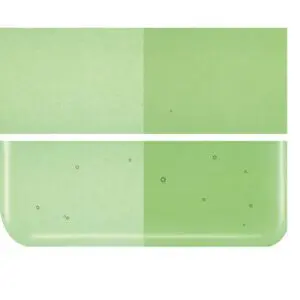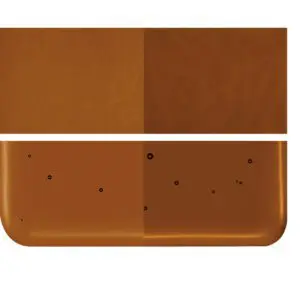1016-50 Silver to Bronze Alchemy Clear Transparent
Original price was: $23.28.$17.46Current price is: $17.46.
Manufacturer: Bullseye Glass Co.
Description
Fusible – Bullseye Compatible
8″ x 10″ +/-
Thickness 2mm
Double rolled, at least one rolled edge
To learn about the performance characteristics of specific glasses, visithttp://www.bullseyeglass.com/products/about-our-glass.html
Reactive Potential
Silver
Cold Characteristics
Unfired sheet has a faint coral tint.
Working Notes
Upon firing, silver foil turns a bronze color wherever it is in
contact with (001016) Alchemy Clear. On the sample tile
above, the left side illustrates silver foil after being fired
uncapped on top of (001016.) The sample’s right side
illustrates silver foil after being fired between a layer of
Clear (any style) and (001016), with(001016) as the cap.
Faint coral color may be evident in any fired work containing
(001016.) Expect variations in effects to result from different
sources and thicknesses of silver, glass production runs,
and heatwork (including firing times, temperatures, and
number of times fired). For warm-hued bronze color
development, we recommend a 1 hour soak at 1225°F / ºC in
the pre-rapid heat section of a firing cycle. If fired rapidly
through this temperature range, the resulting hue will be a
lighter metallic.
Note: Note: When firing silver foil in the kiln, be aware that
the silver reaction can travel across the glass surface and
onto the kiln shelf, potentially affecting silver-sensitive
glasses in one or more subsequent firings. This can happen
even when new shelf release (paper or primer) is applied to
the kiln shelf. When fired between layers, silver is generally
more contained and less likely to affect the firing surface
REACTIVITY WITH RAINBOW IRIDESCENT COATING
Because iridescent coating acts as a barrier, don’t expect
much reaction when using silver directly against this coated
glass. That said, the silver might still make contact with the
glass through thinner sections of the iridescent coating—
resulting in bronze effects caused by (001016)’s silver
reactivity, detailed above. Results vary widely, both in
terms of the effect’s strength and color





